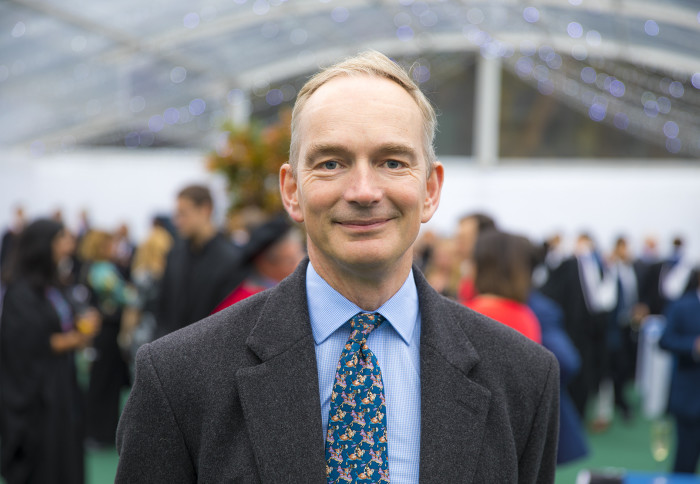Mr Martin Lupton recognised as a kindness leader
by Ellyw Evans

The Faculty of Medicine's Vice Dean for Education, Mr Martin Lupton, is named among the Kindness and Leadership 50 Leading Lights across the UK.
Mr Martin Lupton, Vice Dean (Education) for the Faculty of Medicine and consultant obstetrician at Chelsea and Westminster Foundation NHS Trust is recognised in the Kindness and Leadership: 50 Leading Lights 2020 List. The list celebrates 50 UK leaders who are driving change and making a positive impact with kindness.
Martin Lupton was nominated by colleagues in the School of Medicine who said: “Martin demonstrates daily how being an ethical, considerate and above all kind leader is an enormous strength and not remotely a weakness. In addition to exemplary interpersonal skills, he is a highly skilled orator and writer, often having to communicate with 1000s at one time. He manages to reach every part of the audience on a personal level, often with an excellent story.”

Dr Dimitri Amiras, consultant radiologist at Imperial College Healthcare NHS Trust and honorary senior clinical lecturer at the Department of Surgery and Cancer is recognised in the rising star category.
We spoke to Mr Martin Lupton about why kind leadership matters, his inspiration and how COVID-19 has highlighted moments of kindness across the College.
What does kind leadership mean to you?
I think it revolves around empathy; being sensitive and aware of the particular needs of the people you’re responsible for. A leader may be brilliant at setting out very clear ambitions for the future, but they cannot ignore the individual challenges of the people who they are going to take on that journey. Some people may find some decisions much harder than others, so I think it’s important to try to be attuned to the needs of the people you are working with. I don’t always manage!
Are you inspired by a particular leader?
I’ve always liked cheerful leaders. I feel much more driven by people who are friendly, funny and optimistic. In the modern world, there's a never-ending grind of extra stuff that needs to be done, so if you're doing it in good spirits, that's far better than doing it in gloomy ones!
I think our underlying philosophical approach to the world is also important. I’m a fan of Immanuel Kant’s Categorical Imperative. Kant said: act as you would want all other people to act towards all other people. I think in everything we do we have to try and bear this in mind.
Do you think there are generational differences in perceptions of effective leaders?
Yes, I think there’s a real difference in expectation of style of leadership. I think younger generations expect you to reflect how you feel about something in a way that older generations don't. For younger generations, qualities like kindness and thoughtfulness increasingly matter more than whether you're successful. I think there is sometimes a disconnect in the tone and the manner of our communication and leadership between generations, which we need to always be aware of.
What is the role of kindness in our Faculty?
Given the subject we deal with – trying to make the world a better place through science and medicine – it is unsurprising that there are so many good people in our Faculty and there is certainly not a kindness deficit. I think the challenge for us is to communicate this – how can we be academically excellent and competitive while also being kind and compassionate, given the everyday pressures of our jobs. I think our language and how we conduct ourselves plays a big part.
What moments of kindness have you experienced during your time at Imperial?
I was very touched by the kindness of my colleagues when my father died around two years ago. People I didn’t know very well were sensitive and compassionate and reached out to me. This really stands out in mind as a moment when, as an organisation, many people were very thoughtful.
I think my whole career at the School of Medicine has been filled with experiences of kindness from others – from administrative staff organising goodbye events, to staff going the extra mile to support students and colleagues. I think our administrative staff have a lot to teach us.
What do you think has been the impact of kindness during the pandemic?
I think showing compassion for each other may have had a greater impact on COVID-19 than we give it credit. Our staff have gone the extra mile to help students through this period to make sure that, as a university, we’re not just a deliverer of information, but a good and supportive place to be. There are just so many special examples, from the herculean efforts of our accommodation team to our senior tutors making sure they are available to students in special need over the Christmas holidays.
Article text (excluding photos or graphics) © Imperial College London.
Photos and graphics subject to third party copyright used with permission or © Imperial College London.
Reporter
Ellyw Evans
Faculty of Medicine Centre